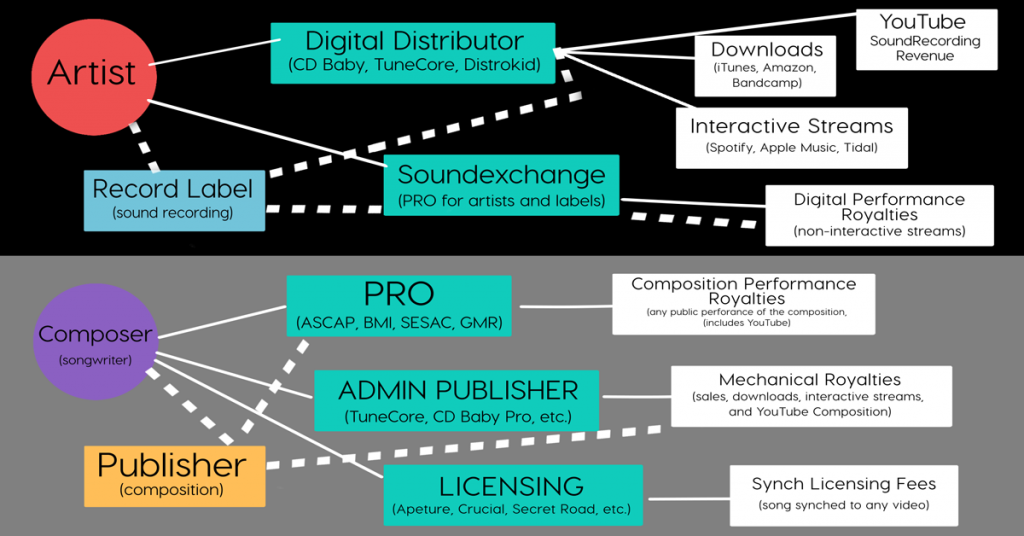Again as long youre registered with a reputable global music publisher like Ditto Music Publishing youll receive both performing and mechanical royalties for every stream. Such as songwriters or composers for the right to use their intellectual property.
Music Publishing Explained Diy Musician
What Are the Types of Music Royalties.

What are royalties in music. Mechanical can sound confusing in the digital age. A very common word in the music business royalties represent the amount of money paid to an artist when someone wants to publicly use that artists work. It is some sort of payment to the king the legal owner of a certain product.
Music Royalties Who Gets Paid Why When and How Collect all your music royalties in four steps. The word royalty usually makes us think of something related a king. A royalty is a payment made to an asset owner for the right to use that asset.
The music industry relies on royalties generated by the licensing of copyrighted songs and recordings as a primary form of payment for musicians. Mechanical royalties are earned per-unit when a song is sold on a mechanically reproduced physical medium ie. They are paid by Performing Rights Organizations PROs like ASCAP SOCAN or BMI and theyre paid by licensors of a particular work sold by a music publisher.
Public performance royalties generate music income for copyrighted works performed. While some see it as a breath of fresh air that promises peace of mind and a. A mechanical royalty is paid by record labels to songwriters for the albums they press featuring the songwriters material.
Musicians and composers are divided about Indonesias new music royalty regulation. Back in the day that meant mechanically producing the physical medium carrying the composition hence the name. The term mechanical royalty comes from the days when records were made mechanically which may help you remember the definition.
Royalties stem from licensing which is the process of giving or getting permission to have produce or use something that someone else has created or owns. Vinyl or physical CDs. But performing royalties are often lumped together with mechanical royalties which are also due for every stream in order to streamline the whole process.
The royalties that MROC distributes to musicians and performers flow mainly from tariffs and levies certified by the Copyright Board of Canada. Nowadays this includes digital downloads and internet streaming as well. Mechanical Royalties Mechanical royalties compensate the songwriters for the reproduction of the composition paid by third-parties that want to record manufacture and distribute the musical work.
We can define royalties in music as the fees paid to rights holders for each use of their music. Royalties are payments that buy the right to use someone elses property. Mechanical royalties generate music income for the physical or digital reproduction and.
Performance AND mechanical royalties. Music royalties are payments made to the owner s of a particular musical work recording melody or performance. For example royalties will be generated when a song is streamed on Spotify.
And in a way that is true. A mechanical royalty is paid on a physical or digital copy of a recorded song. A royalty interest is the right to collect a share of future royalty payments.
The Copyright Board is the economic regulatory body empowered to establish the royalties to be paid for using copyright works. Related to sound recordings AND underlying compositions. Music royalties are payments that go to rights holders.






